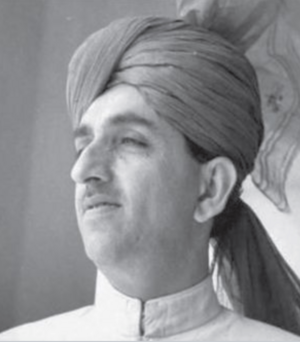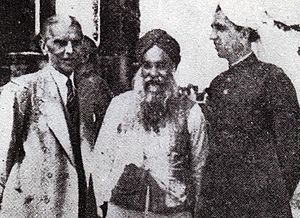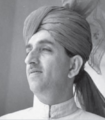Malik Khizar Hayat Tiwana facts for kids
Quick facts for kids
Sir Khizar Tiwana
|
|
|---|---|
 |
|
| Premier of the Punjab | |
| In office 30 December 1942 – 2 March 1947 |
|
| Governor | Sir Bertrand Glancy Sir Evan Meredith Jenkins |
| Preceded by | Sir Sikandar Hayat Khan |
| Succeeded by | Governor rule |
| Personal details | |
| Born |
Malik Khizar Hayat Tiwana
7 August 1900 Chak Muzaffarabad, Punjab, British India (now in Punjab, Pakistan) |
| Died | 20 January 1975 (aged 74) Butte City, California, U.S. |
| Political party | Unionist Party |
| Relatives | Shahzadi Umerzadi Tiwana (daughter)
Malik Nazar Hayat Tiwana (son) Malik Omar Hayat Tiwana (Grandson) |
| Alma mater | Aitchison College |
| Military service | |
| Allegiance | |
| Branch/service | British Indian Army |
| Years of service | 1916-1923 |
| Rank | Captain |
| Unit | 17th Cavalry |
| Battles/wars | World War I Third Anglo-Afghan War |
Lieutenant-Colonel Sir Malik Khizar Hayat Tiwana (7 August 1900 – 20 January 1975) was an important leader from British India. He was a statesman (a skilled political leader), an army officer, and a wealthy landowner. He is best known for serving as the prime minister of the Punjab Province between 1942 and 1947. He was a member of the Unionist Party.
Contents
Early Life and Education
Khizar Tiwana was born in 1900 in a place called Chak Muzaffarabad. This area was in the Punjab Province of British India. Today, it is part of Punjab, Pakistan.
He came from the Tiwana family of Shahpur, a well-known family. His father, Sir Umar Hayat Khan, was a rich landowner and a soldier. His father was also a member of the Council of India, which was an important government body. Khizar went to Aitchison College in Lahore, a famous school.
Military Career
Khizar Tiwana joined the army when he was just 16 years old. On April 17, 1918, he became a temporary officer in the 17th Cavalry. He served for a few months in World War I.
After that, he also fought briefly in the Third Anglo-Afghan War. He was recognized for his bravery during this time. By April 1923, he had been promoted to the rank of captain. After his military service, he helped his father manage their family's large land estates in the Punjab.
Entry into Politics
In 1937, Khizar Tiwana was elected to the Punjab Legislative Assembly. This was a big step into politics. He quickly joined the government of Sir Sikandar Hayat Khan. He became the Minister of Public Works and Local Self Government.
Even though he was not known for his public speaking, he became a trusted member of the government. He was put in charge of the police and maintaining law and order. During World War II, he helped manage the Punjab's efforts to support the war. He also worked to keep peace between different groups.
Khizar helped improve local village councils, called panchayats. He also worked on improving roads and irrigation systems. He strongly supported policies that helped farmers. He also believed in promoting peace among different religious groups.
Premier of the Punjab

In 1942, the previous Premier, Sir Sikandar Hayat Khan, sadly passed away. This left an important position open. Khizar Tiwana was chosen to be the new Premier on January 23, 1943.
He took over during the middle of World War II. Many soldiers from Punjab were fighting, and some were injured or had returned home. The government in Delhi asked Khizar's government to control food prices and rationing. This was to help people in Bengal who were suffering from a terrible famine. These actions made some landowners unhappy.
Khizar, like the Premier before him, did not support the idea of creating Pakistan. He believed in a united India. Jinnah, the leader of the All-India Muslim League, wanted more control over the Punjab government. He argued that the Muslim members of the Unionist Party should follow the Muslim League's orders.
In April 1944, Jinnah asked Khizar to change the Unionist Party's name. He wanted it to be called the Muslim League Coalition Party. Khizar refused, saying his government was a mix of Muslims, Hindus, and Sikhs. Because of this, Khizar was removed from the Muslim League. This caused problems within his own Unionist Party. Some Muslim members had to choose between Khizar and the Muslim League. The Muslim League then started a strong campaign against him.
In 1945, Khizar faced another challenge when Sir Chhottu Ram, an important Hindu leader in his party, died. Jinnah continued to pressure Khizar at the Simla Conference in 1945. This meeting was about forming a temporary government in India after the war. Jinnah insisted that only the Muslim League could choose Muslim representatives. This was seen as a way to weaken the Unionist Party.
Later in 1945, Sir Feroz Khan Noon, a key ally of Khizar, left the Unionist Party. He encouraged other members to join the Muslim League. This led to more people leaving Khizar's party.
In the 1946 Indian provincial elections, Khizar's Unionist Party lost many seats. The Muslim League won many more. However, the Muslim League did not win enough seats to form a government on its own. So, Khizar made a deal with the Congress Party and the Akali Dal. He formed a new government with them. This government had many non-Muslim members, which was new.
The Muslim League protested strongly against this new government. They said it was against the interests of Muslims. Khizar was called a "traitor" for staying in power.
Khizar remained against the idea of dividing India. He believed that Muslims, Sikhs, and Hindus in Punjab shared a common culture. He did not want to divide India based on religion. He once told Jinnah, "There are Hindu and Sikh Tiwanas who are my relatives. I go to their weddings and other ceremonies. How can I possibly regard them as coming from another nation?"
He believed that a Muslim-majority government in Punjab would protect the rights of Muslims in a united India. He even tried to convince the British to create an independent Punjabi state. This state would be separate from both India and Pakistan.
He resigned as Premier on March 2, 1947. This was because of the widespread protests in Punjab. The Governor of Punjab, Sir Evan Jenkins, took control until India was divided on August 14, 1947.
Later Life
After resigning, Khizar Tiwana left politics. He lived in Simla and Delhi for a while after India became independent. In October 1949, he returned to his family's estate in the newly formed Pakistan.
He passed away in Butte City, California, on January 20, 1975. Even at the end of his life, he still believed that dividing India was a mistake. He felt that people from Punjab, regardless of their religion, had more in common with each other than with people from other regions.
Images for kids
 | Jewel Prestage |
 | Ella Baker |
 | Fannie Lou Hamer |



